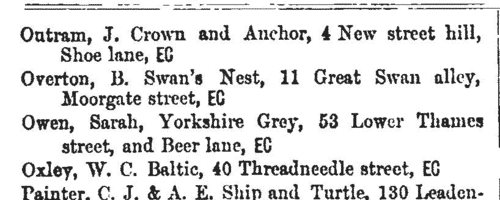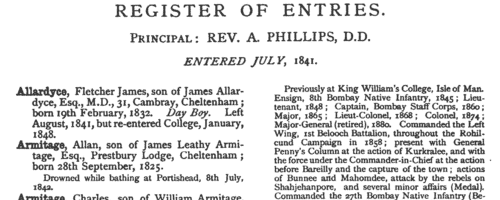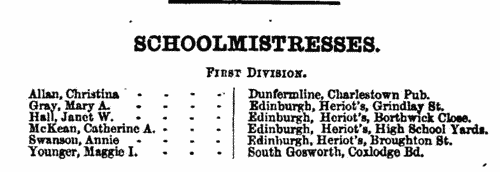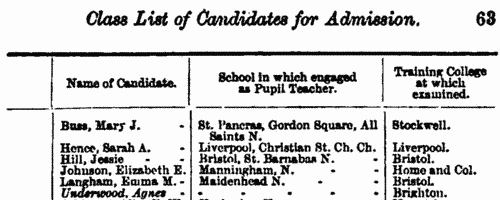Add this eBook to your basket to receive access to all 286 records. Our indexes include entries for the spelling townend. In the period you have requested, we have the following 286 records (displaying 171 to 180): These sample scans are from the original record. You will get scans of the full pages or articles where the surname you searched for has been found. Your web browser may prevent the sample windows from opening; in this case please change your browser settings to allow pop-up windows from this site. Innkeepers and Publicans in the City of London
(1874)
Henry Downes Miles compiled this London and Suburban Licensed Victuallers', Hotel and Tavern Keepers' Directory, which also had sections listings brewers, maltsters, hop factors, distillers and rectifiers of the United Kingdom. | Sample scan, click to enlarge

| Boys entering Cheltenham College
(1878)
Cheltenham College 'was founded in order to provide for the sons of gentlemen a Classical, Mathematical, and General Education of the highest order, on moderate terms, in strict conformity with the principles and doctrines of the Church of England.'
Andrew Alexander Hunter, the college registrar, compiled the first edition of the College Register in four parts from 1883 to 1886: these merely listed the boys by term of entry, with their dates of birth and names and addresses of their fathers. Circulars were also sent out to all Old Cheltonians whose addresses were known, requesting additional details. On the basis of the returns from these and Hunter's further researches, this much fuller register was published in 1890.
The information after each boy's name is given (where known and applicable) in this format: father's full name and address as of the time the boy entered the college; class and department on entering the college (classes being number from 1 downwards, and these again divided into A and B, some into C and D, others into P (Principal's side) and V. P. (Vice-Principal's side) - 1A was the highest class in each department: besides this, certain others were called Addiscombe, Woolwich, Civil, Direct, Line, Sandhurst, Naval, Special, Preparatory, Latin, and India Civil) and the same on leaving, name of Boarding House (or 'Day Boy'), scholastic and athletic honours attained at the college, and subsequent career (including date and place of death, or present address in 1890, if known). | Sample scan, click to enlarge

| English Pupil Teachers training to become Schoolmasters
(1878)
The Education Department set examinations for candidates for admission into training colleges, and to become teachers. This is the class list (in order of merit) of the pupil teachers who passed that examination at Christmas 1878. The list gives the candidate's name (surname first) (prefixed by an asterisk where he was examined on second-year papers), and the school in which engaged (N. for National School, Ch. Church of England, B. British School, W. Wesleyan, R. Roman Catholic, P. Parochial, Bd. Board School, Indl. Industrial School). (The sample scan is from the list for Scottish schoolmistresses) | Sample scan, click to enlarge

| Trainee Schoolmasters in Scotland
(1878)
The Education Department set examinations for candidates for admission into training colleges, and for the office of teacher. This is the list of successful male candidates from Scotland at the examination at Midsummer 1878. The number in the first column shows order of merit in each class in the examination; then there is the name of the candidate (surname, christian name and any intermediate initial(s)), the school in which engaged, and the training college at which examined. The names of pupil teachers are shown in italics, with the 'school in which engaged' column left blank. These abbreviations are used in the names of schools: C. of S., Church of Scotland; Epis., Episcopal; F. C., Free Church; G. A., General Assembly (Church of Scotland); P., Parochial; Pub., Public; R. C., Roman Catholic; Sessl., Sessional; Undl., Undenominational. | Sample scan, click to enlarge

| Bankrupts, Assignees, Trustees and Solicitors
(1880)
Bankruptcy notices in England and Wales, January to March 1880 | Sample scan, click to enlarge

| Debtors
(1880)
County Court Judgments in England and Wales | Sample scan, click to enlarge

| Debtors, Insolvents and Bankrupts
(1880)
Bills of sale (binding assets to a creditor/lender), insolvencies and bankruptcies in England and Wales, July to September 1880 | Sample scan, click to enlarge

| Debtors, Insolvents and Bankrupts
(1880)
Bills of sale (binding assets to a creditor/lender), insolvencies and bankruptcies in England and Wales, April to June 1880 | Sample scan, click to enlarge

| Money lenders and other creditors
(1880)
Bills of sale transferred title in all property of a debtor to a specified creditor. Possession of a bill of sale thus protected a money lender or other creditor from losing a debtor's property to other creditors (except landlords) in case of insolvency or bankruptcy; and in many cases signing a bill of sale was a required step for a borrower securing a loan. The bill of sale specified the amount thereby secured, but could be open, i. e., allow for further drawings on the same account. Entries from the official register of bills of sales in England and Wales were published in Flint & Co.'s London Manchester and Dublin Mercantile Gazette, a weekly publication available only by subscription, issued under the motto "Security in Crediting". The entries are listed by county, then alphabetically by debtor, surname first, with address, trade, the name of the creditor ('in whose favour'), dates of issue and filing, and amount. An &c. after the amount indicates an open bill. The creditors that appear in the 'in whose favour' column are mainly, but not exclusively, loan companies and individual money lenders, and Jewish names figure prominently among the latter. When a loan was paid off, satisfaction of the bill of sale was entered on the register, and these satisfactions are also recorded in these pages. 1 January to 31 March 1880. | Sample scan, click to enlarge

| Bankrupts, Assignees, Trustees and Solicitors
(1881)
Bankruptcy notices in England and Wales, July to September 1881 | Sample scan, click to enlarge

|
Research your ancestry, family history, genealogy and one-name study by direct access to original records and archives indexed by surname.
|











